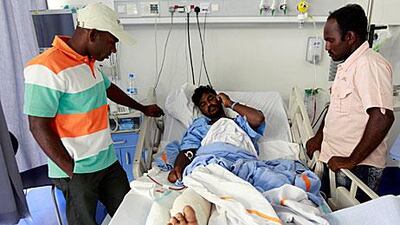DUBAI // The crew of the USNS Rappahannock used "appropriate" force when they opened fire on an Emirati fishing boat near Jebel Ali last year, the US Navy ruled today.
One Indian fisherman died and three others were injured when a security team shot a .50-calibre machine gun at their trawler, Tharath, on July 16.
But a US Navy investigation report into the incident, released today, cleared the crew of wrongdoing.
"The entire sequence of events occurred in less than two minutes," according to the report. "The investigation found that the use of force was appropriate and in accordance with Chairman, Joint Chiefs of Staff Standing Rules of Engagement."
The inquiry concluded that the trawler's rapid speed, apparent collision course, and failure to respond to two attempts to warn it away led the naval security team "to make a reasonable assessment that the boat represented an imminent threat and was demonstrating hostile intent".
Describing the incident as "regrettable", Cmdr Jason Salata, the spokesman for the US navy's Fifth Fleet in Bahrain, said the sailors had an obligation to protect their vessel. "The security team's actions were in line with their official duties to protect the ship from what they reasonably perceived to be a threat," he said.
"The Rules of Engagement states that unit commanders always retain the inherent right and obligation to exercise self-defence in response to a hostile act or demonstrated hostile intent. Historical incidents involving small boat suicide attacks, such as USS Cole and USS Firebolt, have contributed to the shaping of these standing rules."
Maritime vigilance is crucial for crews off the UAE's coast because of its proximity to the Strait of Hormuz, through which a fifth of the world's oil exports pass. There has been tension over recurring Iranian threats to block the strait, concerns about mines and terrorist strikes on offshore oil installations.
Seventeen US sailors died in the Al Qaeda bombing of the USS Cole in 2000 at Yemen's Aden port and three USS Firebolt servicemen died in 2004 when an unidentified dhow exploded while they were on patrol near an oil platform in the northern Arabian Gulf.
There were attacks on the MT Limburg oil tanker in 2002 in the Gulf of Aden, in which one sailor was killed, and a 2010 attack on the M Star tanker in the Strait of Hormuz.
The US Navy report highlighted two warnings issued to the boat.
"The security team employed pre-planned warnings which included use of the Navy's laser warning device and .50-calibre warning shots," said Cmdr Salata. "Due to the high speed and short distances, the entire event occurred in less than two minutes, limiting the ability of the ship to employ other warning methods."
The crew of the Emirati-owned boat insisted there was no warning.
Dubai Police chief Lt Gen Dahi Khalfan Tamim has said prosecutors were investigating and described the decision to shoot as a "clear misjudgment".
Since the incident was in UAE waters, there was speculation US sailors could face prosecution. But Cmdr Salata refuted this.
"The sailors are members of the US Navy. The USNS Rappahannock is a sovereign immune vessel and the individuals involved in this incident were in the performance of their official duties. Under international law, there was no legal requirement to deliver them to local law enforcement."
After the shooting, the US navy paid 500,000 rupees (Dh33,832) in compensation to the family of the man killed and Dh3,300 to each of the three injured men. This matched payouts from India's Tamil Nadu state. The men returned home in February.
They could not be reached for comment, but a friend identifying himself as Raju said: "What is the use of any report now? They lost their jobs, livelihood, their lives changed."
Flyers in Arabic, Urdu, Tamil, Hindi and Malayalam have been distributed by the National Transport Authority in coordination with the Fifth Fleet warning ships not to get close to naval vessels and pay heed to laser, flares and warning shots.
rtalwar@thenational.ae


